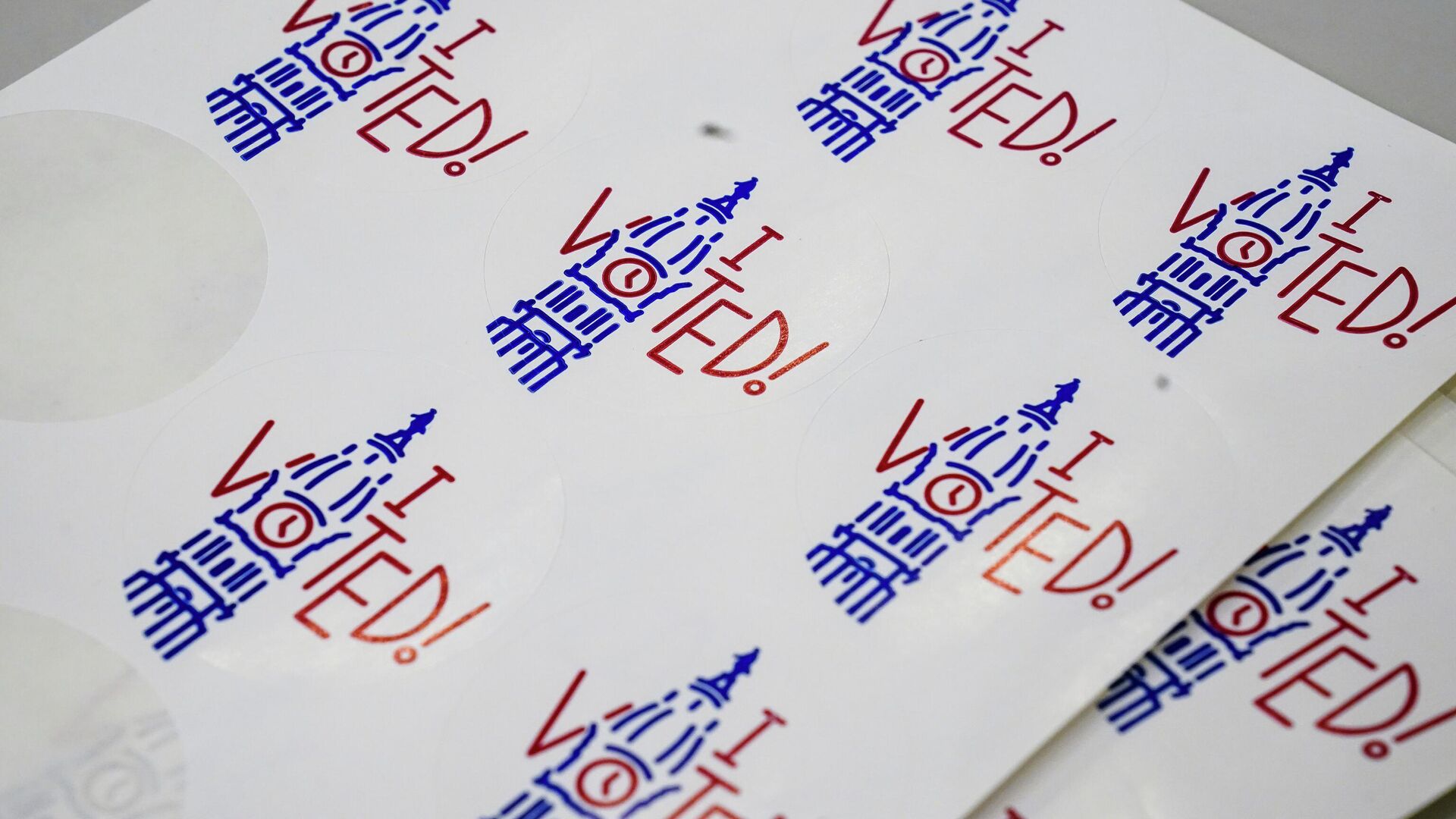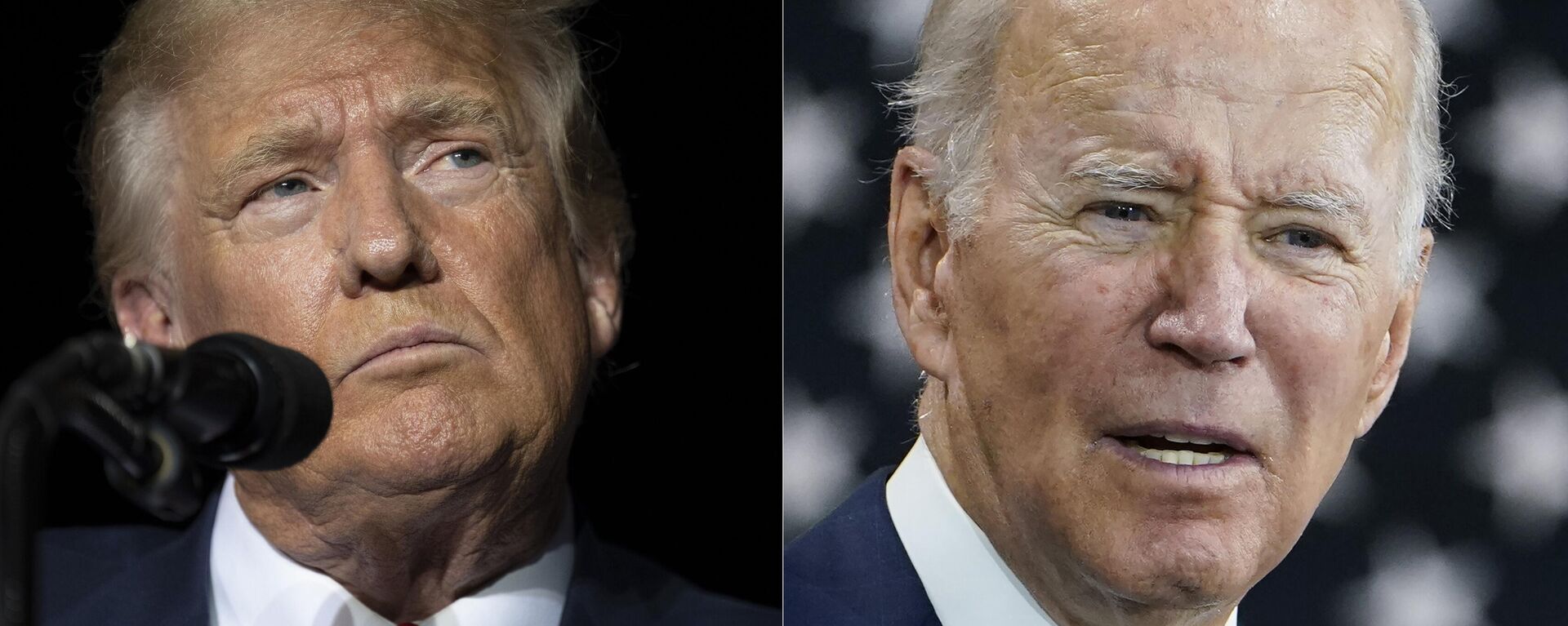https://sputnikglobe.com/20230704/new-voting-machine-skepticism-overshadowing-2024-election-1111651238.html
New Voting Machine Skepticism Overshadowing 2024 Election
New Voting Machine Skepticism Overshadowing 2024 Election
Sputnik International
Given how many Americans believe both the 2016 and 2020 elections to be rigged, any further doubt in the accuracy of voting machines may fall on fertile soil.
2023-07-04T12:35+0000
2023-07-04T12:35+0000
2023-07-04T12:35+0000
americas
2024 us presidential election
donald trump
joe biden
hillary clinton
dominion voting systems
gop
fox
us
us politics
https://cdn1.img.sputnikglobe.com/img/07e6/0b/08/1103915684_0:160:3073:1888_1920x0_80_0_0_ed09dc2696c9bc1b5800929da36f80b8.jpg
As the US federal government is working on new certification guidelines for voting machines, misconceptions and a torrent of misinformation may fuel all sorts of conspiracy theories and further erode trust in the 2024 election following the massive debacle four years ago.The new standards will be rolled out on November 15, 2023, a year ahead of the coming presidential election. The product of years of work by the Election Assistance Commission along with election officials, they are being touted as a "significant leap forward" in requirements on everything from cybersecurity to accessibility for voters with disabilities.However, election officials themselves are anxious that the overhaul of voting machine guidelines, while long-awaited and arguably overdue, may backfire spectacularly and will be used for all sorts of "misinformation".This is highly relevant as, despite all the commissioners' calls for "plain language," the introduction of the new standards already has been marred by vague or contradictory terms. For instance, the authorities have ditched the deceptive term "deprecation" for fear it may be confused with "decertification" of older machines and are instead talking about a "migration" to new standards in a bid to boost the public record and ensure voter confidence.However, the ambiguity stems from the fact that the new standards are being introduced simultaneously as the older ones remain "secure and approved to use", so this is bound to unwittingly trigger further confusion, even if there are no indications of foul play.Voting Machines and Election Fraud ClaimsThis issue is all the more thrilling given that the past two presidential election cycles in the US were far from uncontroversial, and the public, left with a feeling of betrayal and manipulation regardless of political sympathies and party affiliation, won't necessarily be magnanimous and understanding.After 2020, supporters of former President Donald Trump were so confident that the election was stolen from him, that they questioned the security of voting machines, citing numerous irregularities on record alongside other methods that may have potentially altered their outcome such as ballot stuffing. This resulted in a massive push for election audits in swing states, with the GOP advocating for recounting ballots by hand. While their effort failed to sway the election result, the unfolding drama took a long while, cost money and ultimately sowed doubt in the legitimacy of President Joe Biden — an issue he has been increasingly struggling with amid waning popularity.However, faced with accusations of perpetrating election fraud, Dominion Voting Systems, an election technology company, filed a raft of defamation lawsuits against public figures and news networks, accusing them of spreading false narratives and exposing its employees to harassment. Ultimately, Fox and Dominion Voting Systems reached a $787 million settlement, averting a trial.In 2016, a group of computer scientists and lawyers urged Hillary Clinton to challenge the election results in key states after they claimed to have gathered "evidence" to suggest the ballot results were potentially manipulated.That said, any confusion or miscommunication around the new standards, never mind deliberate misinformation, could only fan the embers of election doubt into a roaring flame.
https://sputnikglobe.com/20230626/none-of-the-above-more-us-voters-reject-trump-and-biden-than-back-each-one-1111472895.html
americas
Sputnik International
feedback@sputniknews.com
+74956456601
MIA „Rossiya Segodnya“
2023
News
en_EN
Sputnik International
feedback@sputniknews.com
+74956456601
MIA „Rossiya Segodnya“
Sputnik International
feedback@sputniknews.com
+74956456601
MIA „Rossiya Segodnya“
us elections, us voting machines, fear of rigged elections, election manipulation, election fraud, dominion voting systems, conspiracy theory
us elections, us voting machines, fear of rigged elections, election manipulation, election fraud, dominion voting systems, conspiracy theory
New Voting Machine Skepticism Overshadowing 2024 Election
Given that widespread beliefs that both the 2016 and 2020 US presidential elections were rigged still prevail in American society, any further doubt in the accuracy of voting machines may indeed find fertile ground for speculation.
As the US federal government is working on new certification guidelines for voting machines, misconceptions and a torrent of misinformation may fuel all sorts of conspiracy theories and further erode trust in the 2024 election following the massive debacle four years ago.
The new standards will be rolled out on November 15, 2023, a year ahead of the coming
presidential election. The product of years of work by the Election Assistance Commission along with election officials, they are being touted as a "
significant leap forward" in requirements on everything from cybersecurity to accessibility for voters with disabilities.
However, election officials themselves are anxious that the overhaul of voting machine guidelines, while long-awaited and arguably overdue, may backfire spectacularly and will be used for all sorts of "misinformation".
"We have serious concerns that false information will mischaracterize the consequences of the changes," a letter from the National Association of State Election Directors warned. "All their public communications must be unambiguous."
This is highly relevant as, despite all the commissioners' calls for "plain language," the introduction of the new standards already has been marred by vague or contradictory terms. For instance, the authorities have ditched the deceptive term "deprecation" for fear it may be confused with "decertification" of older machines and are instead talking about a "migration" to new standards in a bid to boost the public record and ensure voter confidence.
However, the ambiguity stems from the fact that the new standards are being introduced simultaneously as the older ones remain "secure and approved to use", so this is bound to unwittingly trigger further confusion, even if there are no indications of foul play.
Voting Machines and Election Fraud Claims
This issue is all the more thrilling given that the past two presidential election cycles in the US were far from uncontroversial, and the public, left with a feeling of betrayal and manipulation regardless of political sympathies and party affiliation, won't necessarily be magnanimous and understanding.
After 2020, supporters of former President Donald Trump were so confident that the election was stolen from him, that they questioned the
security of voting machines, citing
numerous irregularities on record alongside other methods that may have potentially altered their outcome such as ballot stuffing. This resulted in a massive push for election audits in swing states, with the GOP advocating for recounting ballots by hand. While their effort
failed to sway the election result, the unfolding drama took a long while, cost money and ultimately sowed doubt in the legitimacy of President Joe Biden — an issue he has been increasingly
struggling with amid
waning popularity.
However, faced with accusations of perpetrating election fraud,
Dominion Voting Systems, an election technology company, filed a raft of defamation lawsuits against public figures and news networks, accusing them of spreading false narratives and exposing its employees to harassment. Ultimately, Fox and Dominion Voting Systems reached a $787 million settlement,
averting a trial.
In 2016, a group of computer scientists and lawyers urged
Hillary Clinton to challenge the election results in key states after they claimed to have gathered "evidence" to suggest the ballot results were potentially manipulated.
That said, any confusion or miscommunication around the new standards, never mind deliberate misinformation, could only fan the embers of election doubt into a roaring flame.



